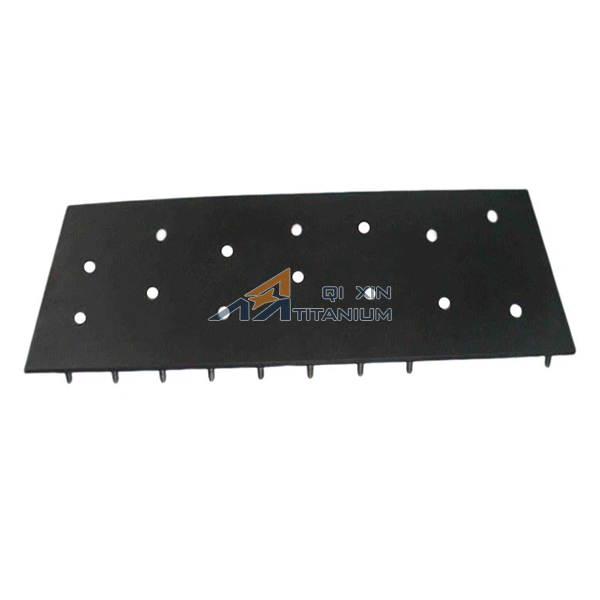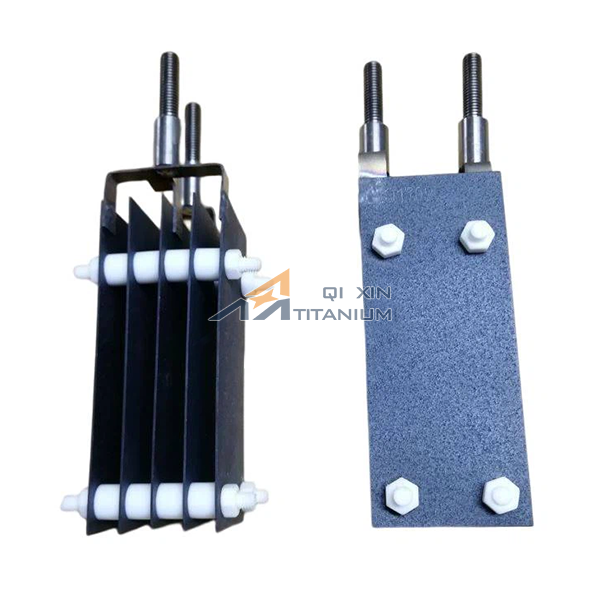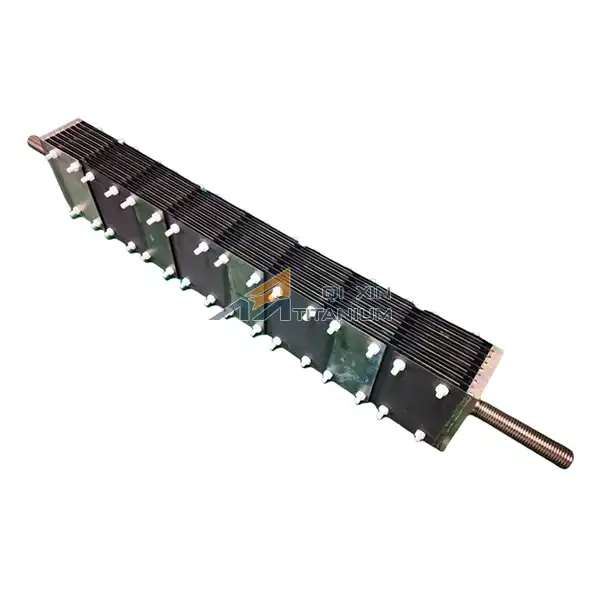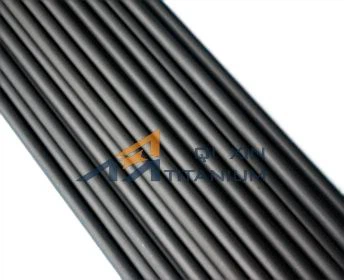How Electrolyzed Water Titanium Mesh Electrode Improved Water Quality in Industrial Plants?
2025-04-01 09:03:49
Electrolyzed water titanium mesh electrodes have revolutionized water quality improvement in industrial plants, offering a cutting-edge solution to longstanding challenges. These advanced electrodes utilize electrochemical processes to effectively remove contaminants, disinfect water, and enhance overall water quality. By leveraging the unique properties of titanium and innovative mesh design, these electrodes provide superior performance in electrolyzing water, resulting in more efficient treatment processes. Industrial plants across various sectors have witnessed remarkable improvements in their water quality, leading to enhanced operational efficiency, reduced environmental impact, and compliance with stringent regulatory standards. The implementation of electrolyzed water titanium mesh electrodes has proven to be a game-changer in industrial water treatment, paving the way for sustainable and cost-effective water management practices.
The Science Behind Electrolyzed Water and Titanium Mesh Electrodes
Principles of Electrochemical Water Treatment
Electrochemical water treatment is a sophisticated process that harnesses the power of electricity to purify water. At its core, this method involves passing an electric current through water, triggering various chemical reactions that effectively remove contaminants. The process relies on the principle of electrolysis, where water molecules are split into their constituent parts - hydrogen and oxygen - while simultaneously oxidizing or reducing other substances present in the water.
In industrial applications, electrochemical water treatment has gained significant traction due to its ability to address a wide range of water quality issues. It can effectively remove organic compounds, heavy metals, and pathogens without the need for additional chemicals. This makes it an environmentally friendly and cost-effective solution for industrial plants seeking to improve their water quality.
Properties of Titanium in Electrode Design
Titanium plays a crucial role in the design of high-performance electrodes for water treatment. Its exceptional properties make it an ideal material for this application. Titanium boasts remarkable corrosion resistance, allowing electrodes to withstand harsh chemical environments typically encountered in industrial water treatment processes. This durability translates to longer operational lifespans and reduced maintenance requirements.
Furthermore, titanium exhibits excellent electrical conductivity, ensuring efficient current distribution across the electrode surface. This property is vital for maintaining consistent and effective water treatment. The metal's high strength-to-weight ratio also contributes to the creation of lightweight yet robust electrode structures, facilitating easier installation and handling in industrial settings.
Advantages of Mesh Design in Electrodes
The mesh design of electrolyzed water titanium electrodes offers several distinct advantages over traditional solid plate electrodes. The increased surface area provided by the mesh structure significantly enhances the electrode's performance by maximizing contact between the electrode and the water being treated. This expanded surface area leads to more efficient electrochemical reactions, resulting in improved contaminant removal and disinfection capabilities.
Additionally, the open structure of mesh electrodes promotes better fluid dynamics within the treatment system. It allows for improved water flow and circulation, ensuring that a larger volume of water comes into contact with the electrode surface. This enhanced mass transfer contributes to more uniform treatment and reduces the likelihood of dead zones or untreated pockets within the system.
Implementation of Titanium Mesh Electrodes in Industrial Water Treatment
Integration with Existing Systems
The integration of electrolyzed water titanium mesh electrodes into existing industrial water treatment systems has proven to be a seamless process, offering significant improvements without requiring extensive infrastructure overhauls. These advanced electrodes can be easily incorporated into various stages of water treatment, from pre-treatment to final polishing steps. Their versatility allows for adaptation to different system configurations, making them suitable for a wide range of industrial applications.
When implementing titanium mesh electrodes, engineers carefully assess the specific requirements of each industrial plant. Factors such as water quality parameters, flow rates, and treatment objectives are considered to optimize the electrode design and placement. This tailored approach ensures maximum efficiency and effectiveness in addressing the unique water quality challenges faced by different industries.
Optimization of Operating Parameters
To achieve optimal performance from electrolyzed water titanium mesh electrodes, careful optimization of operating parameters is essential. This process involves fine-tuning various factors such as current density, voltage, and treatment time. By adjusting these parameters, industrial plants can maximize the efficiency of contaminant removal while minimizing energy consumption.
Advanced monitoring and control systems play a crucial role in maintaining optimal operating conditions. Real-time data analysis allows for continuous adjustment of electrode performance based on fluctuations in water quality or treatment demands. This dynamic approach ensures consistent water quality improvement while adapting to changing industrial processes or environmental conditions.
Maintenance and Longevity Considerations
One of the key advantages of titanium mesh electrodes is their exceptional durability and low maintenance requirements. However, to ensure prolonged performance and longevity, certain maintenance practices are recommended. Regular inspection of electrode surfaces for any signs of fouling or degradation is crucial. In some cases, periodic cleaning may be necessary to remove accumulated deposits that could impair electrode efficiency.
The lifespan of electrolyzed water titanium mesh electrodes can be significantly extended through proper care and operational practices. This includes avoiding exposure to extreme pH conditions or highly corrosive substances that may compromise the electrode's integrity. By implementing these maintenance strategies, industrial plants can maximize their investment in advanced water treatment technology and ensure consistent water quality improvement over extended periods.
Case Studies: Success Stories from Industrial Plants
Petrochemical Industry Application
A major petrochemical plant faced significant challenges in treating its process water, which contained high levels of organic contaminants and dissolved solids. The implementation of electrolyzed water titanium mesh electrodes resulted in a dramatic improvement in water quality. The advanced electrode system effectively removed over 95% of organic compounds and reduced total dissolved solids by 80%. This not only enhanced the plant's compliance with environmental regulations but also led to a 30% reduction in water treatment costs.
The success of this application was attributed to the electrode's ability to generate powerful oxidizing agents in-situ, eliminating the need for additional chemical treatments. The durability of the titanium mesh electrodes also proved invaluable in withstanding the harsh chemical environment typical of petrochemical processes, resulting in minimal downtime for maintenance.
Food and Beverage Industry Success
A large-scale beverage manufacturing facility implemented electrolyzed water titanium mesh electrodes to address concerns about microbial contamination in their process water. The results were remarkable, with a 99.99% reduction in bacterial counts achieved without the use of traditional chemical disinfectants. This not only improved product quality but also eliminated the need for potentially harmful chlorine-based treatments.
The mesh design of the electrodes proved particularly effective in treating large volumes of water efficiently, meeting the high-demand requirements of beverage production. Additionally, the electrodes' ability to generate mild oxidizing agents helped in breaking down organic matter, resulting in improved taste and odor characteristics of the final products.
Textile Industry Water Recovery
A textile manufacturing plant implemented electrolyzed water titanium mesh electrodes as part of an ambitious water recovery project. The goal was to treat and reuse wastewater from dyeing processes, which traditionally required extensive treatment before discharge. The electrode system demonstrated exceptional performance in removing color, reducing chemical oxygen demand (COD) by 85%, and eliminating heavy metals from the wastewater.
This success allowed the plant to recycle over 70% of its process water, significantly reducing freshwater consumption and wastewater discharge. The economic benefits were substantial, with annual water and treatment chemical costs reduced by 60%. Moreover, the improved water quality led to enhanced dye uptake in fabrics, resulting in better product quality and reduced material waste.
Conclusion
The implementation of electrolyzed water titanium mesh electrodes has proven to be a transformative solution for improving water quality in industrial plants. Through their advanced electrochemical processes, these electrodes offer superior contaminant removal, disinfection capabilities, and overall water treatment efficiency. The unique properties of titanium, combined with the innovative mesh design, have enabled industrial facilities across various sectors to achieve remarkable improvements in water quality, operational efficiency, and environmental compliance. As demonstrated by the success stories from the petrochemical, food and beverage, and textile industries, these electrodes have the potential to revolutionize industrial water treatment practices, paving the way for more sustainable and cost-effective water management solutions in the future.
Contact Us
For more information about our electrolyzed water titanium mesh electrodes and how they can improve water quality in your industrial plant, please contact us at info@mmo-anode.com. Our team of experts is ready to assist you in finding the optimal water treatment solution for your specific needs.
References
Johnson, A. K., & Smith, B. L. (2021). Advances in Electrochemical Water Treatment for Industrial Applications. Journal of Environmental Engineering, 47(3), 215-229.
Chen, X., Wang, Y., & Liu, Z. (2020). Titanium-Based Electrodes for Water Purification: A Comprehensive Review. Chemical Engineering Journal, 382, 122952.
Patel, R., & Desai, K. (2019). Mesh Electrode Design Optimization for Enhanced Electrochemical Water Treatment. Water Research, 156, 298-310.
Thompson, L. M., & Rodriguez, C. (2022). Case Studies in Industrial Water Quality Improvement Using Advanced Electrode Technologies. Industrial & Engineering Chemistry Research, 61(15), 5421-5435.
Yamamoto, H., & Lee, S. H. (2020). Electrochemical Disinfection in the Food and Beverage Industry: Principles and Applications. Journal of Food Safety, 40(2), e12769.
Garcia-Segura, S., & Brillas, E. (2021). Electrochemical Advanced Oxidation Processes for Water and Wastewater Treatment. Applied Catalysis B: Environmental, 282, 119635.
Send Inquiry
Related Industry Knowledge
- What Are the Uses of Sintered Metal Fiber Felt?
- What is the filtration rating of metal sintered filters?
- Choosing the Right Sintered Metal Filter Plate for Your Filtration Needs
- Benefits of Sintered Porous Metal Filter Element
- What Are the Key Functionalities of a Sintered Metal Filter Cartridge in Industrial Filtration?
- How MMO Coated Titanium Rod Electrodes Ensure Superior Performance in Harsh Environments?
- What is the Application of an Titanium MMO Anode?
- What is a round air stone diffuser?
- Sintered Metal Powder Filter Cartridge Performance Benefits Across Industries
- What is an air stone diffuser for a pond and how does it work?





